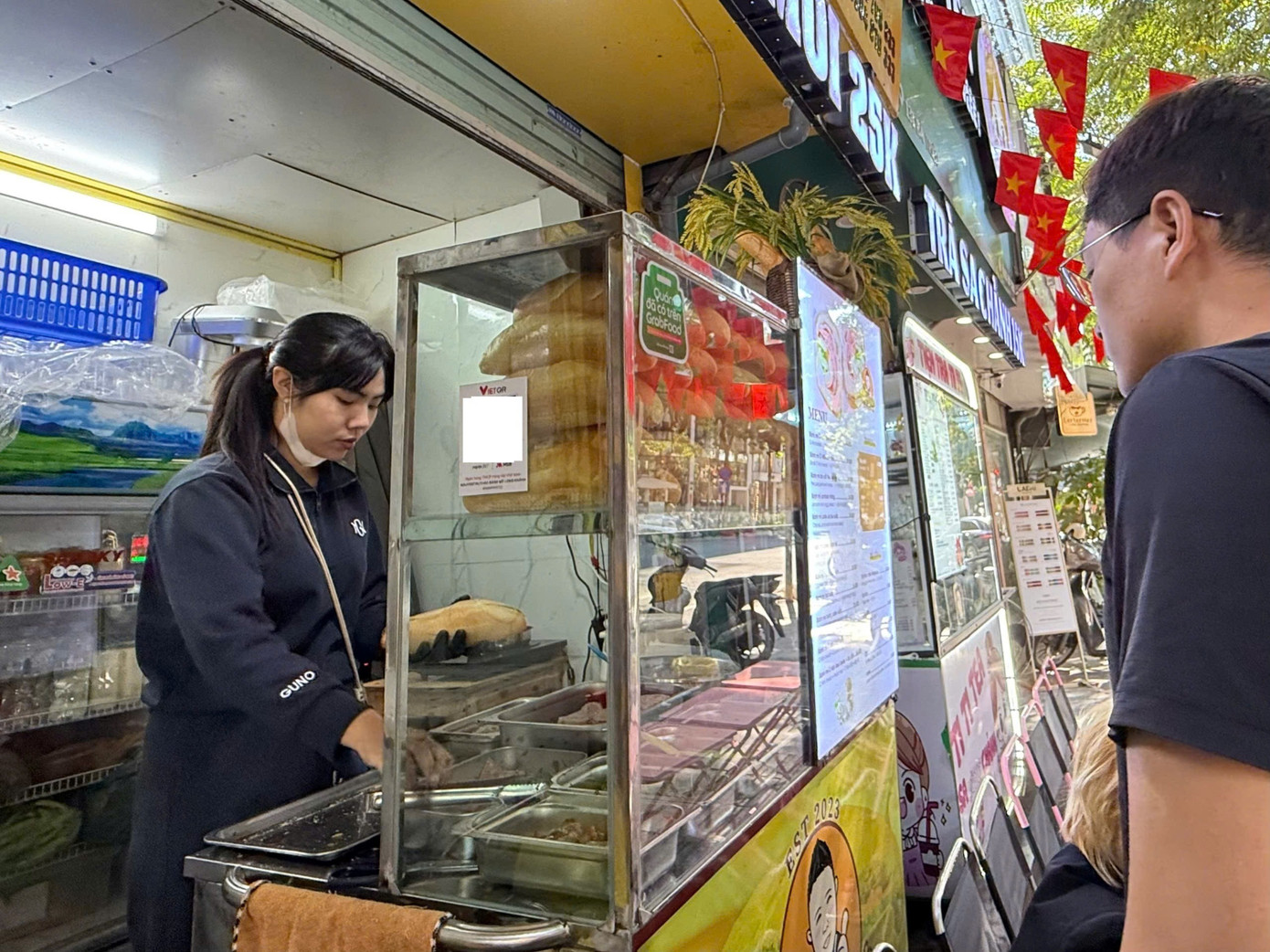Small Profits, Yet Businesses Still Surpass Thresholds
Ms. Thu Thảo, a business owner on Nguyen Du Street, Hanoi, recently increased the price of her best-selling bread from 37,000 VND to 40,000 VND per loaf. She cited the need to issue invoices and calculate taxes as the reason for the price hike.
Beyond in-store sales, Ms. Thảo also operates on three delivery apps. Prices on these platforms are typically 30% higher due to additional platform fees. “The platforms deduct and pay taxes on my behalf, but I still lose a few thousand VND per loaf compared to in-store sales,” she shared.
Her biggest concern is the new tax policy effective from January 1, 2026, which requires businesses with annual revenues over 200 million VND to perform multiple tasks. As a sole proprietor handling everything from preparation to customer transactions, issuing invoices, updating records, and filing periodic tax returns seems daunting. “I’m considering hiring a tax service to handle the paperwork, as managing it alone is overwhelming,” Ms. Thảo admitted.

Many small businesses have limited staff, leaving most tasks to the owner.
At their convenience store in Cau Giay, Hanoi, Mr. and Mrs. Tuyet stock hundreds of products. “While our revenue may seem high, profits are only about 10%,” Mrs. Tuyet explained. “Fortunately, we don’t pay rent, but we still face challenges like expired goods, breakage, and spoilage.”
The tax threshold of 200 million VND in annual revenue has sparked debate. The draft Law on Personal Income Tax proposes exempting individuals with revenues up to 200 million VND from personal income tax.
In the National Assembly, this issue has garnered attention. Many representatives suggest raising the threshold to 1.5 billion VND for certain professions, arguing that 200 million VND is too low.
What Should the Exemption Threshold Be?
Speaking with Tien Phong Newspaper, Dr. Nguyen Ngoc Tu, a lecturer at Hanoi University of Business and Technology, noted that the 200 million VND threshold aligns with the Value-Added Tax (VAT) threshold under the 2024 VAT Law, effective from January 1, 2026. The Personal Income Tax Law must align with VAT regulations to avoid discrepancies.
Dr. Tu highlighted that profit margins vary widely across industries. Retail businesses typically earn 5-10% profit, while wholesalers may only see 1-2%. In contrast, service industries like hair salons and laundromats enjoy margins of 40-50% due to lower overhead costs.
He explained that VAT is ultimately paid by consumers, with businesses acting as collectors for the government. Personal income tax, however, is different. Salaried workers receive deductions for dependents, but business owners, akin to companies, must pay taxes on all income without such deductions. Since expenses are often unclear, taxable income is calculated as a percentage of revenue, ranging from 0.5% to 5% depending on the industry—a standard international practice.

Experts recommend the Ministry of Finance assess the impact, review tax exemptions, and establish transparent revenue determination methods.
Dr. Tu argued that taxing personal income based on 200 million VND in revenue is unfair, as taxes should reflect profit, not revenue. However, comparing business owners to salaried workers is also inaccurate.
Currently, revenue determination methods are imprecise, often relying on estimates or negotiations between businesses and tax authorities. This allows many businesses with revenues of hundreds of millions or even billions to evade taxes, creating significant loopholes.
Raising the threshold from 100 million VND to 200 million VND could exempt over 2 million businesses (more than 40% of the total). Dr. Tu recommends the Ministry of Finance assess the impact, review exemptions, and establish transparent revenue determination methods. Initially, the 200 million VND threshold could remain, with mandatory invoicing from January 1, 2026, to clarify actual revenues before considering further adjustments.
Do Duy Thanh, Director of FnB Director Consulting, noted that 200 million VND annually (16.7 million VND monthly) is barely enough to cover operational costs in urban areas. In the food industry, net profits range from 8% to 15%, leaving owners with just 1.33 to 2.5 million VND monthly. Spas yield 10-20% profit (1.67 to 3.34 million VND), while retail businesses, with the thinnest margins, earn only 334,000 to 1.34 million VND monthly.
These figures indicate that the 200 million VND threshold barely sustains operations, let alone generates meaningful income. Business owners rely on their labor rather than profits.
“Fair policies should be based on income-generating capacity, not nominal revenue,” Mr. Thanh emphasized. “By analyzing net profit margins, we can determine minimum revenue thresholds for basic income levels.”
The food industry requires 600-800 million VND annually for monthly incomes of 6-10 million VND. Spas and retail businesses need similar thresholds. The gap between 200 million VND and these minimums highlights the impracticality of a uniform threshold across industries.
Mr. Thanh believes raising the threshold from 100 million VND to 200 million VND is progress but insufficient given rising costs. Exemptions based on net income would be fairer than those based on nominal revenue. With digital data available, policies should be industry-specific, taxing only excess income, similar to the progressive personal income tax system.
How Much Tax Do Businesses Under 1 Billion VND/Year Pay? A Surprising Figure Revealed!
Small businesses with annual revenue under 200 million VND are exempt from VAT and personal income tax. Those earning between 200 million and under 1 billion VND annually must pay taxes at a percentage rate based on their industry-specific revenue.
Revised Title:
“Parliamentary Delegate Proposes Tax Threshold for Household Businesses at Minimum of VND 500 Million to VND 1.5 Billion”
According to delegate Hoàng Văn Cường, for retailers and agents, the minimum taxable threshold should be 1.5 billion VND. For service providers and businesses that do not incur material costs, such as construction contractors who do not include material expenses, this threshold should be at least 500 million VND.
MPs Urge Exemption of Inheritance Tax on Gold Bars for Future Generations
The proposed 0.1% personal income tax on each gold bar transaction has garnered significant attention from National Assembly delegates during their deliberations.



















